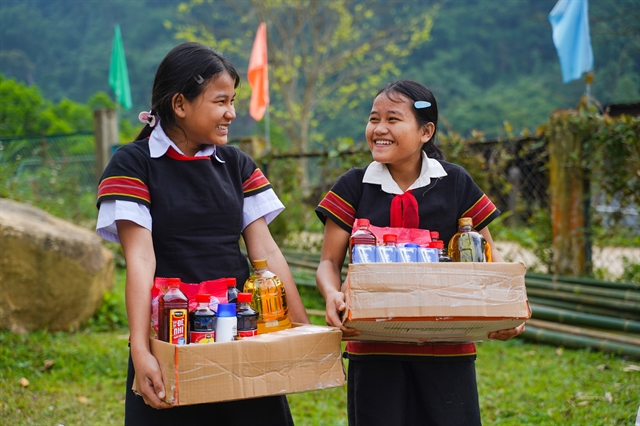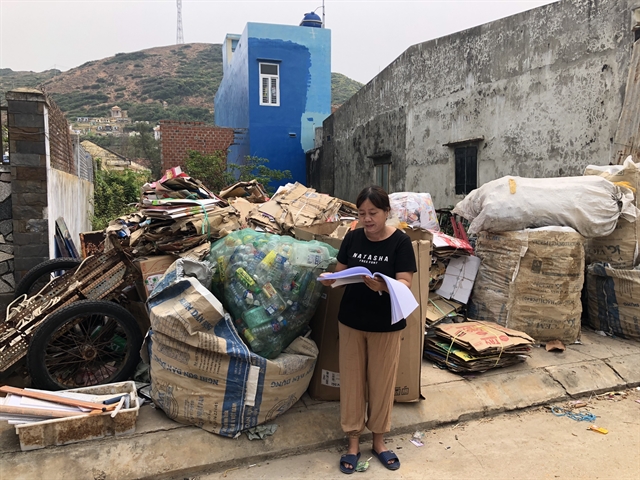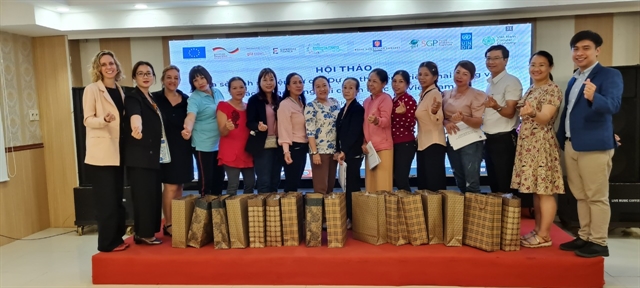 Environment
Environment

The informal sector plays a pivotal role in Việt Nam's solid waste management system as over 30 per cent of the waste is estimated to be collected through this channel

|
| A woman checks a waste depot for recycling. The informal sector in Việt Nam collected 30 per cent of the solid waste management system. Photo courtesy of UNDP |
BÌNH ĐỊNH — The informal sector plays a pivotal role in Việt Nam's solid waste management system as over 30 per cent of the waste is estimated to be collected through this channel, and knowledge of the role and the needs of informal networks in the waste management systems in Việt Nam is needed to prepare for their potential integration into the evolving national and international policy frameworks.
This information was shared at a recent workshop on "Lessons Learned from Pilot Projects Working with Women Informal Waste Workers in Việt Nam" in the central coastal Bình Định Province.
The workshop, which was part of the 'Rethinking Plastics' project co-hosted by the Europe Union-Federal ministry for economic cooperation and development of Germany (EU-BMZ) and UNDP Việt Nam, highlighted diverse case studies, research and innovations in contributing to recognising the roles and contributions of informal waste workers in the waste management value chains.
In Việt Nam, the government issued Decree No. 08/2022/ND-CP on January 10, 2022, comprising chapters on waste management, Extended Producers Responsibility (EPR) and incorporating the roadmap for the circular economy.
The introduction of a mechanism in the Law will reduce environmental leakages and generate additional financial flows for increased collection and recycling of packaging. The EPR may create opportunities and pose challenges for the collectors and aggregators.
At the workshop, the pilot activities in the cities of Quy Nhơn City, HCM, Hạ Long were introduced jointly with the non-profit organisations in charge of their implementation.
They focused on strengthening the livelihoods of informal waste workers and supporting their recognition and/or inclusion in the waste management systems.

|
| Informal women workers and participants join a workshop on ‘Lessons Learned from Pilot Projects Working with Women Informal Waste Workers in Việt Nam’ in Quy Nhơn City. Photo courtesy of UNDP |
Speaking at the workshop, Caitlin Wiesen, UNDP Resident Representative in Việt Nam, said: “Recognising, collaborating, supporting, and ultimately enhancing the roles and contributions of informal waste workers is key to strengthening local waste management systems."
"Combined with awareness campaigns and effective community mobilisation, they are an essential part of the transition towards green and inclusive cities. To set a transition to a Just Circular Economy model in motion, UNDP will continue our work towards empowering women and generating a green, inclusive economic rebound.
“Waste and plastic are, in fact, economic resources. We need to segregate, collect, and recycle our waste to fast-track the development of markets for secondary materials that are localised and inclusive of women workers at all stages."
Ngô Hoàng Nam, an official from Quy Nhơn City’s People’s Committee, said: “It is an important workshop for us. We hope to receive many valuable ideas in waste management for practical applications and sound, creative suggestions for Quy Nhơn City to implement the Law on Environmental Protection.”
According to Fanny Quertamp, Senior Advisor Việt Nam for the Rethinking Plastics project, the mandatory EPR scheme for packaging, which will be in force in 2024, is a significant step in generating opportunities and challenges for the waste collectors. The traceability of the packaging value chain that will be required will impact the current waste management organisation and is an opportunity to integrate and recognise the collectors as contributors to the circular economy.
“I am very happy to join this workshop. I find this job helps me feed my family and contributes to keeping the environment clean. I look forward to participating in more workshops and activities. I will continue this useful work,” said Lê Thị Phú, an informal waste worker from Dĩ An town in the southern Bình Dương Province.
At the workshop, mechanisms were collectively discussed to enhance the systematic collection of grassroots initiatives, strengthen their uptake at the policy level, and collaborate with other organisations to improve the livelihoods of waste workers and recognise their critical roles in the transition toward a circular economy in Việt Nam.
On March 2, 2022, at the UN Environment Assembly, the world's ministers of the environment endorsed critical resolutions that established a foundation for introducing an international legally binding agreement to end plastic pollution. The roles of informal waste workers have been recognised in an environmental resolution. — VNS